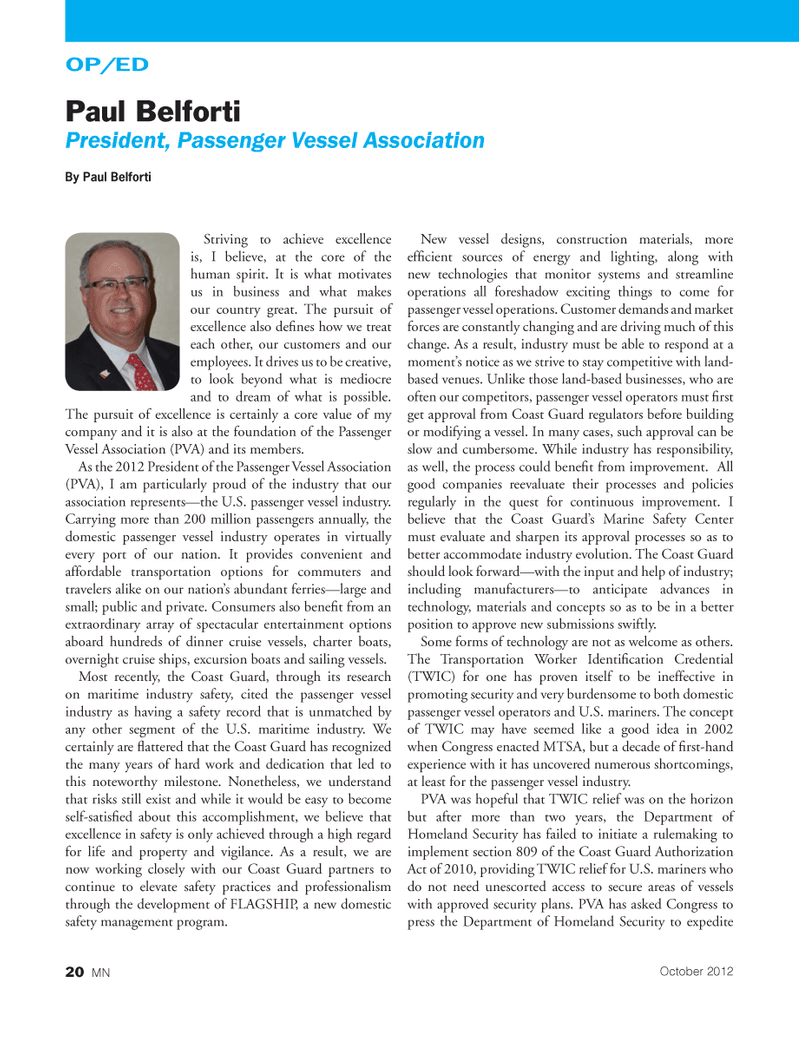
Page 20: of Marine News Magazine (October 2012)
Year in Review & Leadership
Read this page in Pdf, Flash or Html5 edition of October 2012 Marine News Magazine
Striving to achieve excellence is, I believe, at the core of the human spirit. It is what motivates us in business and what makes our country great. The pursuit of excellence also deÞ nes how we treat each other, our customers and our employees. It drives us to be creative, to look beyond what is mediocre and to dream of what is possible. The pursuit of excellence is certainly a core value of my company and it is also at the foundation of the Passenger Vessel Association (PVA) and its members. As the 2012 President of the Passenger Vessel Association (PVA), I am particularly proud of the industry that our association representsÑthe U.S. passenger vessel industry. Carrying more than 200 million passengers annually, the domestic passenger vessel industry operates in virtually every port of our nation. It provides convenient and affordable transportation options for commuters and travelers alike on our nationÕs abundant ferriesÑlarge and small; public and private. Consumers also beneÞ t from an extraordinary array of spectacular entertainment options aboard hundreds of dinner cruise vessels, charter boats, overnight cruise ships, excursion boats and sailing vessels. Most recently, the Coast Guard, through its research on maritime industry safety, cited the passenger vessel industry as having a safety record that is unmatched by any other segment of the U.S. maritime industry. We certainly are ß attered that the Coast Guard has recognized the many years of hard work and dedication that led to this noteworthy milestone. Nonetheless, we understand that risks still exist and while it would be easy to become self-satisÞ ed about this accomplishment, we believe that excellence in safety is only achieved through a high regard for life and property and vigilance. As a result, we are now working closely with our Coast Guard partners to continue to elevate safety practices and professionalism through the development of FLAGSHIP, a new domestic safety management program. New vessel designs, construction materials, more efÞ cient sources of energy and lighting, along with new technologies that monitor systems and streamline operations all foreshadow exciting things to come for passenger vessel operations. Customer demands and market forces are constantly changing and are driving much of this change. As a result, industry must be able to respond at a momentÕs notice as we strive to stay competitive with land- based venues. Unlike those land-based businesses, who are often our competitors, passenger vessel operators must Þ rst get approval from Coast Guard regulators before building or modifying a vessel. In many cases, such approval can be slow and cumbersome. While industry has responsibility, as well, the process could beneÞ t from improvement. All good companies reevaluate their processes and policies regularly in the quest for continuous improvement. I believe that the Coast GuardÕs Marine Safety Center must evaluate and sharpen its approval processes so as to better accommodate industry evolution. The Coast Guard should look forwardÑwith the input and help of industry; including manufacturersÑto anticipate advances in technology, materials and concepts so as to be in a better position to approve new submissions swiftly. Some forms of technology are not as welcome as others. The Transportation Worker IdentiÞ cation Credential (TWIC) for one has proven itself to be ineffective in promoting security and very burdensome to both domestic passenger vessel operators and U.S. mariners. The concept of TWIC may have seemed like a good idea in 2002 when Congress enacted MTSA, but a decade of Þ rst-hand experience with it has uncovered numerous shortcomings, at least for the passenger vessel industry. PVA was hopeful that TWIC relief was on the horizon but after more than two years, the Department of Homeland Security has failed to initiate a rulemaking to implement section 809 of the Coast Guard Authorization Act of 2010, providing TWIC relief for U.S. mariners who do not need unescorted access to secure areas of vessels with approved security plans. PVA has asked Congress to press the Department of Homeland Security to expedite OP/EDPaul Belforti President, Passenger Vessel Association By Paul Belforti 20 MNOctober 2012MNOct2012 Layout 18-31.indd 20MNOct2012 Layout 18-31.indd 2010/2/2012 9:34:13 AM10/2/2012 9:34:13 AM

 19
19

 21
21
